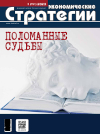Some Aspects of Compiling Ratings and Assessing their Quality
DOI: 10.33917/es-5.191.2023.126-131
In the modern world, ratings have become an instrumental component that provides analysis, forecast and support for management decisions at both the macro, micro and meso-levels. The increasing intensity of flows and volumes of information, its multidimensional nature, the variety of formats for its presentation and communication for transmission in the context of increasing complexity of economic and social phenomena and processes, have created a powerful demand for ratings in business, in the financial and investment sphere and in strategic management, as well as at the state level. This is explained by the fact that ratings are independent, impartial, methodologically sound and allow, based on a wide range of metrics, to assess the competitiveness of countries, regions, industries and companies. Taking into account the ratings, subsequent investment decisions of the key economic players are formed.
References:
1. Sovetskii entsiklopedicheskii slovar’ [Soviet Encyclopedic Dictionary]. Pod red. A.M. Prokhorova, 4-e izd. Moscow, Sovetskaya entsiklopediya, 1989, 1632 p.
2. Tekhnologii reitingov [Rating Technologies]. Konsaltingovaya gruppa MD, available at: http://md-consulting.ru/articles/html/article19.html
3. Handbook on Constructing Composite Indicators: Methodology and User Guide, available at: https://www.oecd.org/sdd/42495745.pdf
4. 2023 Index of Economic Freedom, available at: https://www.heritage.org/index/
5. Economic Freedom. Fraser Institute, available at: https://www.fraserinstitute.org/studies/economic-freedom
6. The Global AI Index. Tortoise, available at: https://www.tortoisemedia.com/intelligence/global-ai/
7. AI Index. Stanford University, available at: https://aiindex.stanford.edu/report/
8. Ageev A.I., Zolotareva O.A., Zolotarev V.A. Rossiya v global’nom mire iskusstvennogo intellekta: otsenka po mirovym reitingam [Russia in the Global World of Artificial
Intelligence: Assessment by World Rankings]. Ekonomicheskie strategii, 2022, no 2(182), pp. 20–31, available at: DOI: https://doi.org/10.33917/es-2.182.2022.20-31
9. Doklady o razvitii chelovecheskogo potentsiala [Human Development Reports]. UNDP, available at: http://hdr.undp.org/en
10. Doklady o global’nom gendernom razryve [Reports on the Global Gender Gap]. World Economic Forum, available at: https://www.weforum.org/reports/
ab6795a1-960c-42b2-b3d5-587eccda6023
11. Ramki kachestva statisticheskoi deyatel’nosti OESR [OECD Statistical Quality Framework]. OECD, available at: https://www.oecd.org/sdd/
qualityframeworkforoecdstatisticalactivities.htm
12. Data Quality Assessment Framework-Generic Framework. IMF, available at: https://www.imf.org/external/np/sta/dsbb/2003/eng/dqaf.htm#P50_2523
13. Evropeiskaya komissiya. Evrostat. Kachestvo. Evropeiskie standarty kachestva. Kodeks praktiki evropeiskoi statistiki [European Commission. Eurostat.
Quality. European quality standards. European Statistics Code of Practice]. Eurostat, available at: https://ec.europa.eu/eurostat/web/quality/european-qualitystandards/european-statistics-code-of-practice.




